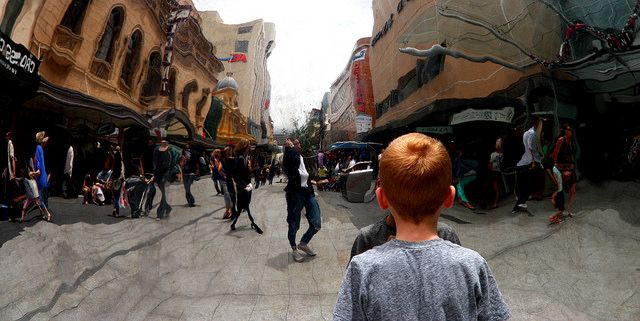Real Men, Real Crimes: The Underreported Sexual Abuse Of Boys

Imagine yourself 6 years old once again and then try and picture your former (tiny) self within the world.
At that very young age, Rick Goodwin was lured by a construction worker into a vacant house and sexually assaulted there. As his profile reads, Goodwin just “somehow knew that he could not tell his parents.” He did, then, what he believed a boy is supposed to do and kept quiet, burying the hurt as deep as he could. Though he maintained good grades in school, he became involved with drugs, yet instead of an unchecked downward spiral, his drug use surprisingly led to epiphany: a college acid trip triggered memories of the abuse and from there he sought counseling. Today Goodwin is a therapist who runs the Men’s Project, a free-standing clinic treating male survivors in Ottawa.
Far too automatically, people associate childhood sexual abuse with girls yet boys suffer as well. Quite possibly, they do so in greater numbers than you might expect.
The Numbers
The National Intimate Partner and Sexual Violence Survey notes “11.7 percent of men have experienced unwanted sexual contact.” Based on cited research, the website 1in6 reports “16 percent of males were sexually abused by the age of 18.” A report from the Crimes Against Children Research Center reports five to 10 percent of adult men recall an incident of childhood sexual abuse or assault. There are clear discrepancies here, certainly in part due to how you might describe sexual abuse.
“We use the word unwanted in our mission statements, since many men cannot get their arms around the fact that they were abused, but they can get their arms around unwanted,” Steve LePore, founder and executive director of 1in6, told Medical Daily. In his organization's mission statement, these experiences are referred to as "unwanted or abusive sexual experiences in childhood.” As he further explains, this covers a range of experiences, including exposure to pornography, touching, and assault.
Experts say such crimes against boys are difficult to determine primarily because they often go underreported.
“Men have a very difficult time talking about it," LePore said. "Even after very high profile cases, like Sandusky, it’s still difficult for men to look at and work on this issue.” LePore is referring to Jerry Sandusky, the convicted serial child molester and retired football coach.
“No man wants to say they were abused,” LePore said. “That’s just how we’re hard-wired, it’s part of the masculine code.”
Because boys (and the adult men they someday become) too often fail to notify others of these incidents, to get an accurate picture of the abuse of boys, it is helpful to look at a variety of reports including this Centers for Disease Control and Prevention datasheet which notes 4.5 percent of boys between grades 9 and 12 reported forced sexual intercourse — just one form of sexual abuse — at some time in their lives. The same report estimates 6,526 males between the ages of 10 and 24 received emergency medical treatment as a result of nonfatal injuries sustained from a sexual assault between 2004 and 2006.
Finally, a study of the sexual abuse of minors by Catholic priests found 81 percent of total victims were male and over 40 percent of all victims were males between the ages of 11 and 14. More generally, 22 percent of both male and female victims were under the age of 10.
In the end, the numbers matter only as much as they translate back into people. For men who have experienced abuse, the main point underlying any statistic is that others have suffered the same. Whether it is 4 in every 100 men or 16, many men's lives have been affected in some way by abuse.
Long-term Effects
Each man’s response to childhood abuse is unique, still many survivors share quite similar reactions whether they are boys or girls. Many abusers commonly tell children both that it is their fault and they should not tell anyone, as a way to shift the blame onto the child and unfortunately, these ugly tactics work. As Rape, Abuse & Incest National Network describes it, survivors of childhood sexual abuse experience a toxic cocktail of intense negative emotions, including shame and guilt, betrayal and distrust. Men, in particular, often worry about their masculinity and secretly fear they are not masculine enough following any unwanted sexual experiences in childhood. Later in life, depression and anxiety are common as are sleep disturbances and self-injury. Formerly-abused children often struggle with addiction.
“It could be substances, it could be pornography, it could be a work addiction,” LePore said.
Until the issue is confronted and problems sorted, the real work of healing does not begin. So the very first step for almost all men is dismantling the taboo that prevents them from speaking up and saying, This happened to me, I need some help. This happened to me and I’m afraid of what it is doing to my family.
"There’s a universal response that we hear," LePore said. "Almost every man will say they thought they were the only one."
Once acknowledge, the relief begins. LePore says some men are ready to jump into a support group immediately, while others must work slowly before they take next steps in the healing journey. In the meantime, 1in6 provides a 24/7 support line for those who want anonymous information about anything concerning childhood abuse. Looking ahead, the organization recently won a grant from the Ahmanson Foundation of Los Angeles to provide an online support group with a therapist. Though healing takes time, the connections help, and in time, many a former abused child finds his way to happiness.
"This is not hopeless, this situation can be worked through," said LePore. "Many men have reclaimed their lives."



























